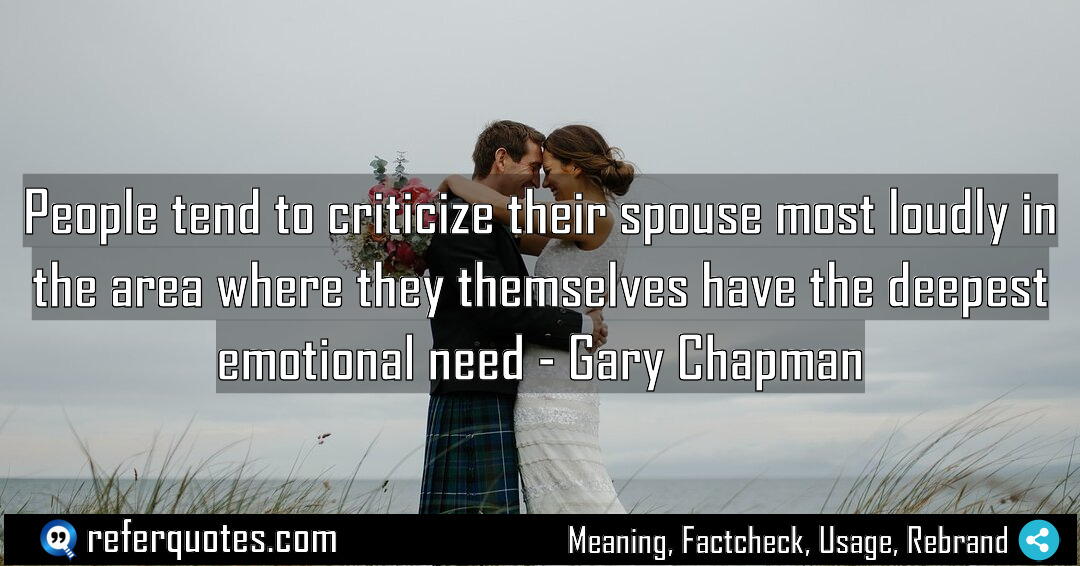
You know how people tend to criticize their spouse most loudly… It’s because that very area is where they have their own deepest, unmet emotional need. It’s a painful form of projection we see all the time in relationships.
Share Image Quote:
Table of Contents
Meaning
At its core, this quote means our harshest complaints about our partner are often a distorted cry for our own unmet needs.
Explanation
Let me break this down for you. After years of seeing this play out, it’s less about blame and more about a raw, human vulnerability. Think of it like this: if you have a deep, almost primal need for security, and you feel it’s not being met, you won’t say “Honey, I feel incredibly insecure.” No. You’ll laser-focus on your partner’s financial habits, their career choices, anything that *feels* unstable to you. Your criticism is a misguided alarm bell for your own internal wound. It’s a painful form of projection. The volume of the complaint is directly proportional to the depth of the personal hunger.
Quote Summary
Reading Level60
Aesthetic Score70
Origin & Factcheck
This insight comes directly from Dr. Gary Chapman’s seminal 1992 book, The 5 Love Languages, published in the United States. It’s a cornerstone concept from his work, not a misattributed internet quote. He developed this idea through decades of pastoral counseling.
Attribution Summary
Author Bio
Dr. Gary Chapman is a pastor/counselor who authored many books such as Five Love Languages which has transformed millions of relationships. He teaches families and couples on how to express love and care in ways that are understood. He holds multiple degrees from Wheaton, Wake Forest, and Southwestern Seminary, he blends scholarship with real-life counselling. For a quick overview of his works, check this Gary Chapman book list and find tips for better marriage, parenting, and personal growth.
| Official Website | Facebook | X| Instagram | YouTube
Where is this quotation located?
| Quotation | People tend to criticize their spouse most loudly in the area where they themselves have the deepest emotional need |
| Book Details | Publication Year/Date: 1992; ISBN/Unique Identifier: 9780802412706; Last edition: Revised Edition (2015); Number of pages: 208 |
| Where is it? | Chapter 3: Falling in Love, Approximate page 48, Revised Edition (2015) |
Context
Chapman introduces this not as a weapon to use against your partner, but as a key to self-awareness. In the book, it’s the crucial “aha” moment that helps people stop the blame cycle. It’s framed as a diagnostic tool for understanding the *real* conflict happening beneath the surface arguments about chores or affection.
Usage Examples
Here’s how you can actually use this wisdom:
- For Yourself: The next time you find yourself fuming about your partner, pause. Ask: “What does this criticism say about what *I* need right now?” This shifts you from victim to agent.
- For Coaches & Therapists: Use it to help clients reframe their arguments. Instead of “your partner is neglectful,” explore “what is the deep need for connection that feels neglected *in you*?”
- In a Talk or Workshop: It’s a powerful way to explain why couples can get stuck on the same argument for years. They’re fighting about the symptom, not the disease.
To whom it appeals?
| Context | Attributes |
|---|
| Theme | Wisdom (1754) |
|---|
| Audiences | couples (158), married people (8), psychologists (197), relationship coaches (27), therapists (555) |
|---|
| Usage Context/Scenario | communication classes (26), conflict resolution training (11), emotional intelligence workshops (23), psychology blogs (1), relationship advice columns (2), relationship podcasts (13), therapy sessions (129) |
|---|
|
|
|
|
|
|
|
|
|
|
|
Share This Quote Image & Motivate
Motivation Score60
Popularity Score80
Shareability Score65
FAQ
Question: Does this mean my partner’s criticism is always my fault?
Answer: Absolutely not. It’s not about fault. It’s about understanding the *root* of the criticism. Their delivery might be poor, but the need beneath it is real and valid.
Question: What if my partner is genuinely irresponsible? Isn’t criticism justified?
Answer: Of course, there are legitimate issues. But the *intensity* and *frequency* of the criticism is the clue. Calmly addressing a behavior is one thing. Relentless, loud criticism usually points to a deeper, personal emotional trigger.
Question: How do I apply this without becoming a doormat?
Answer: Great question. This isn’t about tolerating bad behavior. It’s about changing the conversation. Instead of “You never help around the house!” (a criticism), you learn to say “I feel overwhelmed and I have a deep need for partnership and support. Can we talk about that?” (a statement of need). It’s stronger, not weaker.
Question: Is this just for romantic relationships?
Answer: Not at all. You see it with parents and kids, in friendships, even in the workplace. Anywhere there’s an emotional investment, this dynamic can show up.
Similar Quotes
When you express love in your spouse’s love language… it’s not just a nice idea, it’s a fundamental key to unlocking a deeper, more resilient connection. Think of it as…
When we choose active expressions of love in the primary love language… it’s not just a nice idea, it’s a game-changing strategy. This concept fundamentally shifts how you approach conflict,…
If we learn to meet our spouse’s emotional need… it’s a game-changer. This simple idea from Gary Chapman flips the script on relationship struggles, suggesting that security and significance aren’t…
When people feel heard, they rarely feel angry. It’s a simple truth that transforms conflict into connection, and it’s the secret to de-escalating almost any tense situation. Table of Contents…
Emotions lose their tyranny when you see them clearly in the light of awareness. It’s a game-changer because it shifts you from being controlled by your feelings to simply observing…
